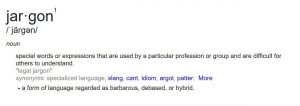
I don’t really like to begin a post with a definition, but I think it’s important that everyone understand what jargon is: A form of ineffective communication.
Jargon seldom helps make a point well. At best, jargon is an imprecise way to communicate messages quickly. At worst, it leaves others completely oblivious to your meaning. Unfortunately, it’s common.
We work with clients in numerous industries, and each one has its own terminology and industry speak. In most cases, jargon develops as a short-hand way to communicate with industry peers. Too often, routine use of jargon becomes a habit and is used to communicate with those outside your industry.
Lawyers, for instance, often use Latin phrases such as ex parte and de jure to talk about their work. Healthcare professionals use acronyms such as AFIB, DRG and HIPAA when talking with patients. And engineers use technical descriptions that most others struggle to comprehend.
Check out this YouTube video to see what I mean about technical jargon. (By the way, this wasn’t a joke. It was a real video to explain their new technology.)
Make you messages simpler
Recognizing your own use of jargon is a good way to eliminate it and create more effective and easier-to-understand messages.
For businesspeople, that might mean leveraging assets and creating a S.W.A.T team that will peel the onion to identify commonly used business jargon. Hopefully this solution will change the workplace paradigm, create buy-in from the team and empower associates to move the needle on business marketing and communications. In other words, you might consider talking with peers about jargon in your organization and work together to find better ways to talk with potential customers about your business or organization.
When in doubt about whether you are using jargon, think about your audiences. A fundamental rule of communications is that if a message is sent but not understood, it’s as if the message was not sent at all.
Don’t waste your valuable time. Work on getting jargon out of your vocabulary.
Ed Green
Senior Strategist
P.S.
If you’re having trouble deciding what jargon you are using now, just Google your profession and “jargon.” You’ll find lots of examples.
Here’s an example of some PR (public relations) jargon. And yes, I’ve used some of these expressions and terms recently.




